I listen to radio programmes every morning in the bathroom. There, I’ve admitted it! A few Sundays ago, I was listening to Radio 4 and they featured an appeal by the much- acclaimed musician, poet and actor, Benjamin Zephaniah. He told listeners that:
“The arts transformed my life. I remember the exact day I chose the road that led away from crime towards a life of music and poetry.”
Benjamin talked about his own experience of prison, and how being in prison can make a bad start in life worse. He explained how Good Vibrations’ gamelan music projects have helped people collaborate, to find hope for the future, and break the cycle of re-offending.
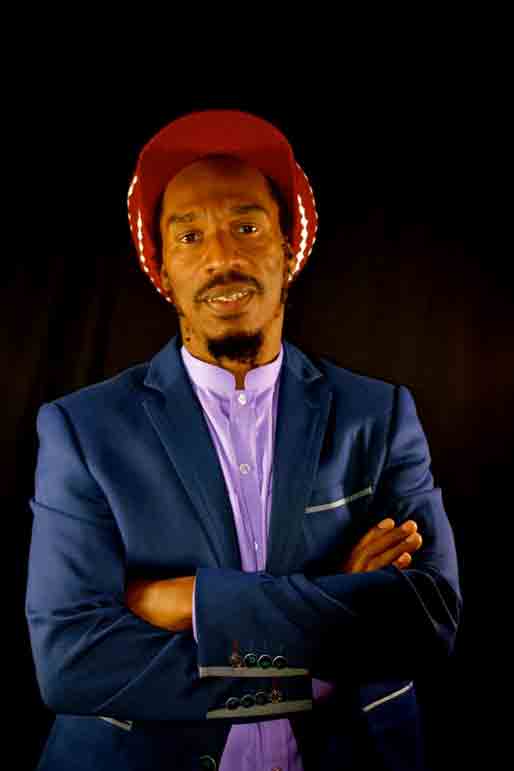
You can listen online at: https://www.bbc.co.uk/programmes/m000lmj5
So, in a small nutshell, that’s how I heard about the work of Good Vibrations (GV).
https://www.good-vibrations.org.uk/
I was intrigued. Much of my own life and work has been spent developing and supporting creative work with young people. Over the years, I’ve had over 40 books published, many about creative work with young people, using games, exercises, arts and music.
Now, I’m semi-retired, but back in the increasingly misty past I was a youth worker in England, particularly in London in the 1970s, and then Training and Publications Officer for community alternatives to custody for young people in Scotland. That work was called ‘youth social work’. Currently, I also run musical ‘noise workshops’. I use the title ‘MSFN’ (Make Some Fuckin’ Noise), all about ‘participation’ and having fun, with predominantly non-musicians of all ages, mostly using percussion – steel tongued drums, hangs, tubular bells, kalimbas – thumb pianos, Tibetan singing bowls, gongs, African drums, cajons, djembes , jaws’ harps and lots more. Indeed, the more bizarre the better – I even use a specially developed wooden electronic laser-harp that anyone can play by touch!
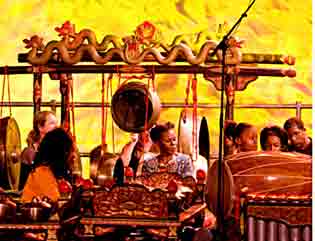
The work of Good Vibrations
I contacted Good Vibrations and received a really positive response from the staff team. And developing from that, it’s a privilege to share some information about the work of the organisation. Firstly, ‘What is gamelan?’ They told me:
“Gamelan music is the traditional music of Indonesia. The gamelan is a family of instruments such as gongs, chimes, drums, and xylophones. It is very accessible and communal, and everyone’s contribution is equally important. Our gamelan courses mainly use gamelan orchestras (of instruments) from Java.
Gamelan is extremely effective at enabling participants to develop confidence, and transferable life and work skills, since it’s accessible, and easy to learn the basics, and you don’t need previous musical experience to do it. Gamelan also has a philosophy of behaviour – about equality, respect, co-operation, and reflection – that helps players to focus their behaviour, and better understand how they can work more effectively with others.”
Here’s what one user of the Good Vibrations service has said:
“Good Vibrations has demonstrated the way it can win the confidence of people from all backgrounds and work with them to achieve outcomes that they could never have expected… For me the most important benefits are the building of a more positive sense of self and the creation of optimism about what might be achieved in the future.”
Peter Wright, Director of Forensic Services at Nottinghamshire NHS Mental Healthcare Trust
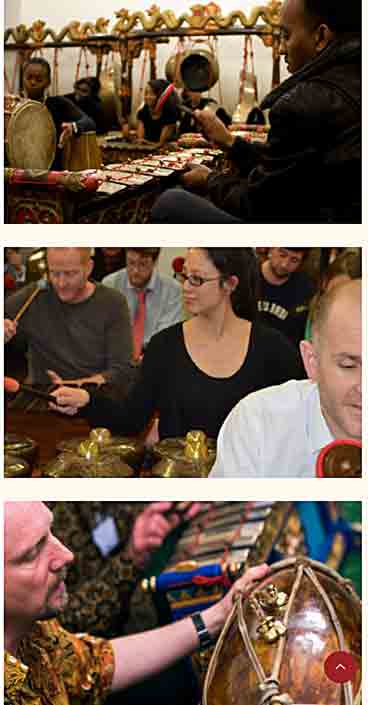
Here’s more about the work and ethos of Good Vibrations
Alan: Thanks for the invitation to have a chat about your organisation and your work. I believe that your ‘vision’ is to help create a safer and more-empathetic UK, where vulnerable people, including those convicted of offences, are given the chance to become valued members of society, and to forge fulfilling, constructive lives. How does that translate into your hands-on practice?
Good Vibrations: We work across the UK in prisons, secure hospitals and community settings. We support people with mental illness, disabilities, and additional social and health needs. Many of these people are marginalised by society and given fewer opportunities to achieve and fulfil their potential.
Our projects are radically inclusive. They use music-making as a starting point, but no experience is needed to take part. They take an unfamiliar genre – Indonesian gamelan – to create a level playing field where everyone is equally new to the medium. Our projects engender respect, working together, and openness. A substantial research base exists about Good Vibrations, and tells us that participants on our projects: develop social and group skills; improve their communication skills; experience achievement that for many prompts engagement with formal educational programmes; report reduced anxiety levels and an increased ability to cope with stress; and improve their anger management skills.
Alan: And you use communal music-making as one of your key means to work with vulnerable and at-risk people…can you explain and how and where you undertake that work? Actually – Why gamelan?
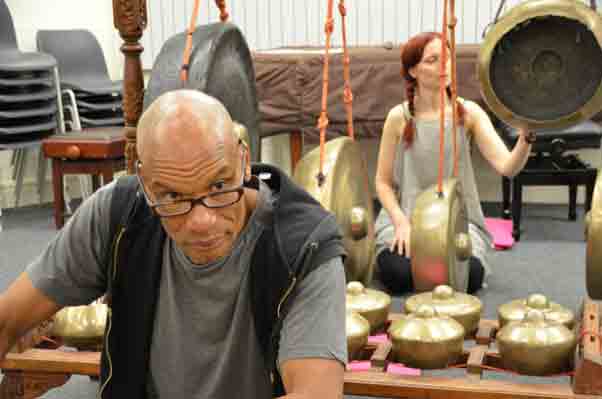
Good Vibrations: We are best known for using the gamelan, an Indonesian tuned percussion orchestra, where each person plays on a different instrument, creating extraordinary layers and textures of sound together as a group. We deliver a range of music projects and support and advocacy programmes.
Participants compose music, improvise, conduct, record a CD and perform to an invited audience. We often integrate elements such as dance, technology, expressive movement and spoken word. There is always time made for reflection and discussion throughout the project, and there is a focus on inclusiveness, mutual respect and empowerment. Participants can gain Open College Network Team-working accreditations and Arts Awards and can join our free Keep in Touch (KIT) programme, which supports them with further opportunities e.g. volunteering, bursaries, traineeships and links to support services. We work across England and in Scotland in prisons, young offender institutions, and secure hospitals with men, women and young people. And we work in community spaces and day centres in Nottingham and Glasgow.
The choice of medium – gamelan – is crucial:
- It’s novel, so people tend not to form prejudices about it
- It’s accessible and adaptable for all abilities
- It’s formed of layers, so as you fit your part in, you grow listening and non-verbal communication skills
- It can be played without any prior musical training or knowledge of musical notation
- It’s communal, so everyone’s contribution is equally important
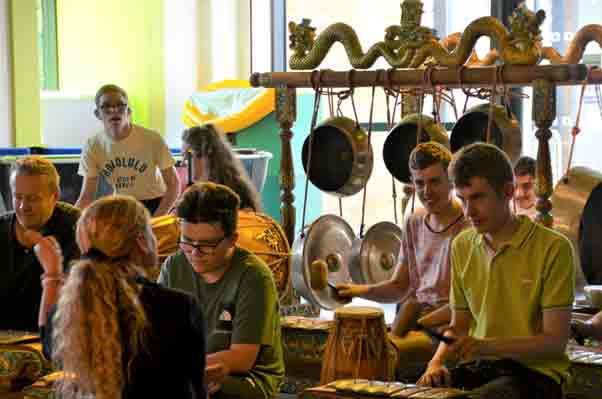
Alan: GV states all the many benefits of the fascinating project, but are there easier selections of instruments, arts, crafts etc. which might also produce similar positive outcomes?
Good Vibrations: We firmly believe in the power of participatory arts in general to support people’s wellbeing, creativity, confidence and transferable skills. Other group music-making activities such as African drumming and Samba have similar positive effects. One of the beautiful additional benefits of gamelan music though is that it is melodic as well as rhythmic, allowing for even more interesting and complex sounds and textures to be created. This also supports participants to gain an even greater sense of achievement.
Alan: You’ve been in existence since 2003…How and where did you start?
Good Vibrations: Good Vibrations was set up in 2003 by Cathy Eastburn, a professional fundraiser and amateur gamelan player at The Southbank Centre. Cathy was impressed by how positive the experience of playing gamelan in a group was for her own well-being. So she decided to bring this opportunity to a group who were extremely marginalised – prisoners. She started Good Vibrations as a project under the auspices of as East Midlands-based charity, the Firebird Trust. However given its early success with prisons and the positive impacts that independent evaluators saw the project having, Good Vibrations became a charity in its own right from 2008.
Alan: That’s fascinating. I actually visited the gamelan room deep down in the Southbank Centre. Can you tell me about how you recruit your staff and what skills you are looking for in members of the GV team?
Good Vibrations: We are not necessarily looking for expert gamelan players in our facilitators. We are looking for people who are calm, reliable, open, collaborative, and who value difference. We look for people with extremely well-honed interpersonal and listening skills. We look for people who can facilitate learning and empower others, rather than those who want to teach in a more directive and set way.
Alan: When I was a team leader of youth work teams, I always looked for older young people and adults who had empathy, but who especially understood the need to enable and facilitate vulnerable and damaged young people? Would you agree that that is important?
Good Vibrations: Yes, this is hugely important. We look for team members who value and enact our core values, which are:
- Openness
- Supportive environments
- Collaboration
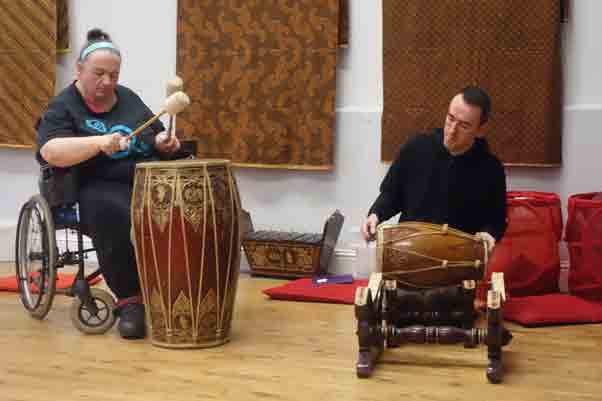
- Sustainable approaches
- Creativity
- Respecting and valuing all
- Evidence-based approaches
- Critical reflection
- Flexibility
- Self-responsibility
- Professionalism
Alan: I believe that you focus a lot on providing positive experiences for young people that can help them see themselves as ‘successful’ – all about positive self-identities. How do you achieve that? Can you give a couple of examples?
Good Vibrations: Here is some feedback from participants, family members and audiences to try and answer this question:
“I feel high up in gamelan – I don’t mean I’m above everyone – do you know what I’m trying to say? It’s brought out my confidence – taught me a hell of a lot about music. I would be nowhere without these lessons. I want to go as far as I possibly can. OCN [an accreditation] was me proving to yous how much you have taught me. I’ve picked up a lot from gamelan.”
“Your project builds confidence and self belief, it allows you to take something you know little of nothing about and develop it with others and within 5 days you are then skilled and confident enough to showcase that to others, not just staff, not even your family but your fellow prisoners, that’s massive.”
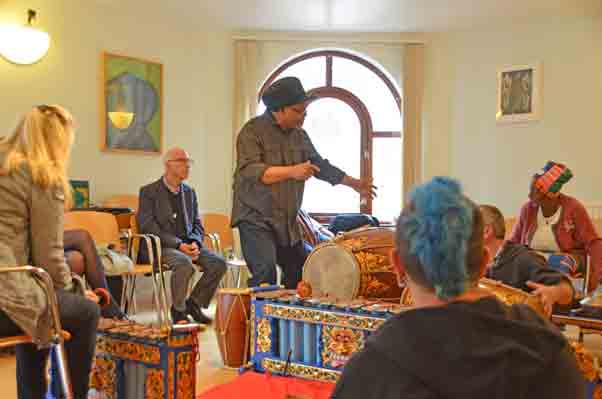
“They were standing up and talking in front of others, doing group work and working as a team, concentrating – you can see quite clearly. And this is a difficult group, who desperately need to develop social skills. They were clearly proud of it, and the cultural element was a bonus. The highlight for me is the fact they are standing up and talking – they don’t do this. They’re talked to. We struggle to get them to do this in education sessions.”
Alan: How do GV workshops provide a springboard into work and learning opportunities? I think that you refer to them as providing ‘transferable life-skills’.
Good Vibrations: Researchers have concluded that our courses act as gateways into further learning, getting prisoners into the education department, enrolling on English and Maths courses, who would never previously have done. This is largely due to gamelan’s uniqueness; in the gamelan ensemble no one is an expert, and everyone is equal. This removes intimidating elements that are often found in formal education. Here are some examples:
“The project appears to act as a stepping-stone into further education”. (2010 Birmingham City University)
“Gamelan supports isolated prisoners to develop inter-personal and team-working skills that can help them cope better with being in prison, and so contribute to reductions in self-harm incidents and suicide … Through communal music-making, people who don’t normally socialise have discovered they can cope better in group environments.” (Birmingham City University research, 2006 and 2010)
All participants are invited to try conducting the group to take control of who plays when, how. This empowering experience will help develop communication skills.
“Communicating with other participants leads to greater tolerance and, for some, these greater levels of tolerance and openness continue after release from prison”. (2010 Birmingham City University research).
Alan: My own work was very much focussed in trying to offer community-based alternatives to custody and prison? We used ‘group work’ and individual support. You work in variety of settings and in different parts of the UK. Can you give some examples?
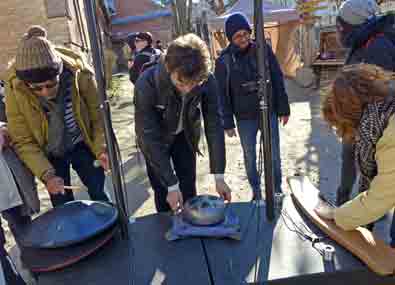
Good Vibrations: We run: weekly group gamelan music workshops in the Inpatient Unit of HMP Wormwood Scrubs – for people with mental health needs; weekly Loophole Music sessions (technology and acoustic Western instruments) for mental health patients at Bethlem Royal Hospital; weekly group gamelan workshops at Middle Street Resource Centre in Nottingham for people with disabilities and mental health needs; week-long group gamelan projects for women at HMP Peterborough, young people at Wetherby YOI, men at HMP Stoke Heath, and men at HMP Thorn Cross; and week-long projects for people with disabilities and mental health needs at the Royal Conservatoire of Scotland.
Alan: With my own current work on the street and at festivals across Europe, my being a non-musician sharing instruments with people of all ages, is about creativity and fun through musical noise-making. It’s not about my own musical abilities. Does that spirit of participation underlie your own approaches?
Good Vibrations: 100%. That’s another beautiful element of gamelan – that’s it’s all about a whole group contribution, rather than a lead person and backing group. Everyone is equal and everyone contributes. And we don’t insist that groups only learn and play traditional gamelan music – we support them to do so if they want to, but largely we focus on enabling them to use the gamelan orchestra as a medium to express themselves and create music in whatever way they want to. It is fascinating how different the end products come out as can be seen on our Soundcloud page:
https://soundcloud.com/goodvibrations-org/hmp-stoke-heath-this-is-the-day-the-music-made
https://soundcloud.com/goodvibrations-org/lochgoilhead-hum
https://soundcloud.com/goodvibrations-org/insect
https://soundcloud.com/goodvibrations-org/this-could-be-1
https://soundcloud.com/goodvibrations-org/first-samurai
Alan: My friend Phil Bayliss worked in training for prison education. He has a few questions he’d like to ask you.
Phil: From my experiences of visiting and working in prisons in the south-west of England, many prisoners really value learning. How do you select learners for your gamelan orchestra?
Good Vibrations: We don’t, is the short answer. We ask them to volunteer to join a project if they are interested. One of our facilitators visits each prison or project location a few weeks before the project and talks to people individually, answering their questions about what it would involve, and what they might get out of the project. We ask key members of staff at delivery partner organisations to help us to market the opportunity as widely as possible to groups who might benefit. These are often people lacking in confidence, people who have social anxieties, people with personality disorders etc.
Phil: Security is paramount in prisons. What are the problems of bringing inside, and playing, so many instruments?
Good Vibrations: We take our gamelan orchestras into prisons in big vans and have detailed inventories for all the instruments and beaters. Everything is then checked for drugs and anything dangerous as we go into prison. Each session we check that everything is still there, and all instruments are checked again on leaving the prison. It’s not simple, but this is where our 17 years’ of experience comes in handy. And we are very fortunate to have many facilitators still on the team who have been with the charity since the beginning.
Phil: Can you tell me a bit about your sponsors and ‘learning accreditation’ which is mentioned in your information on the web site?
Good Vibrations: We don’t have many corporate sponsors yet and are actively trying to gain more. We have many corporate partners though who give time and resources in kind to us, which is invaluable. Companies such as KPMG, Home Planet, Lloyds of London, The Money Advice Service, Safestore, and The Indonesian Embassy have supported us.
In terms of ‘learning accreditations’, some of our projects are accredited by nationally-recognised awards, such as the Discover Arts Award, or the London Open College Network accreditation in Team Working Skills.
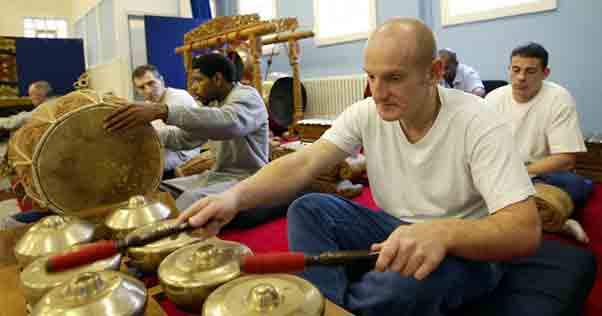
Phil: Sorry, I can’t quite relate the ‘fun’ Alan mentioned to prisons! Is it really?
Good Vibrations: It can be. These projects can help people forget they are in prison:
“This is a space I come to and I don’t feel I’m in jail. I’m always looking for something artistic to take me out of the environment. Some of you were strangers but there’s a human connection – it’s magical, to bond in a group where I don’t know everyone but when playing the music, I feel I do.”
“I liked it because it made me feel like I wasn’t in prison. It was a bit of freedom. It wasn’t just the space – I mean the room’s nice, but taking part took my mind off all the stuff that’s going on in the outside world. And Laurence [the facilitator] was a good man and we got on with him and we had a laugh with him.
“I really enjoyed taking part, it gives a sense of freedom. I feel happier and more positive about myself”.
“We all enjoyed the course, putting our whole heart and soul into it. It helps to give you a great enjoyable, meaningful activity”
“People should give it a try, they’d realise how much fun it was”
Alan: Many thanks for sharing some insights into your work. It sounds fascinating. Innovative. Creative and much needed in our society at a time when many people feel rejected, under-valued and lacking in opportunities to grow and flourish.
Good Vibrations: It’s a pleasure. We are keen to tell as many people about this innovative initiative as possible – so that we can bring it to many more people who might enjoy and benefit from it. Do get in touch with Katy Haigh on 07535 145 797 or [email protected] if you would like to know more.
**********************************************************************************
Good Vibrations have established a reputation for being professional and effective, particularly when working with individuals with extremely complex needs, whom other interventions have failed to engage.
- Bill Bailey, Lord Ramsbotham and Rahayu Supanggah support GV work as patrons.
- They are a Registered UK Learning Provider and recognised OCN Qualification Centre.
- GV were awarded National High Secure Prison Effective Intervention Status in 2010.
- GV has developed what they call, a robust set of policies and procedures, which are implemented and regularly monitored. These define their guiding principles, create structure, guide decision-making and ensure uniform standards throughout the organisation.
- They are actively looking to develop new partnerships across the UK.
Alan Dearling

